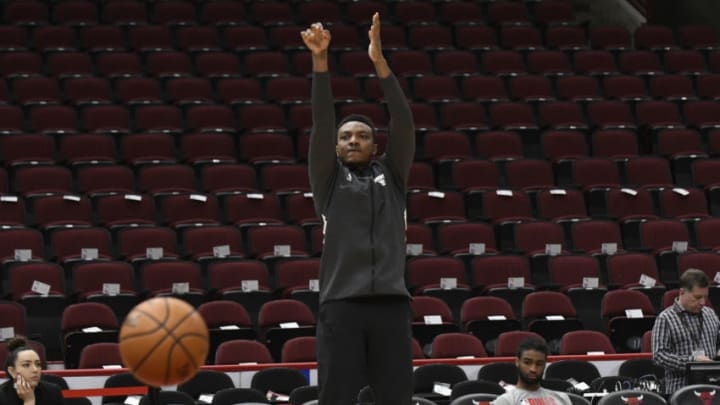The Chicago Bulls second-year center Wendell Carter Jr. didn’t have the 2019-20 season that was expected out of him after a decent rookie campaign.
As an important piece of the Chicago Bulls young core, the former Duke Blue Devils 6-foot-9 and 270 pound center Wendell Carter Jr. needs to have a bounce back third season in the NBA. Largely due to more injury problems and poor usage by now former Bulls head coach Jim Boylen, WCJ actually took a step back in terms of his efficiency and a lot of his per game stats during the 2019-20 regular season.
During the shortened 2019-20 regular season with the Bulls, WCJ played in 43 games (all of which he started in). And he averaged 11.3 points per game, 9.4 rebounds, 1.2 assists, 0.8 steals, and 0.8 blocks. WCJ shot 53.4 percent from the field, 20.7 percent from beyond the arc, and 73.7 percent from the free-throw line.
That amounted to a career-low -2.4 box plus/minus rating, .127 win shares per 48 minutes, -0.1 value over replacement player rating, 3.3 total win shares, 59.0 true shooting percentage, 15.5 player efficiency rating, and a 115 offensive rating/108 defensive rating. Some of the advanced metrics for Carter Jr. were improved from his rookie to his sophomore season in the NBA, but most were a step back.
WCJ actually registered a lower RPM (per ESPN) during the 2019-20 campaign than fellow Bulls big man Luke Kornet did. He posted a -0.66 RPM during the 2019-20 season. His RAPTOR total rating during the 2019-20 campaign was also set at -2.7, outside of the top 200 players in the NBA.
So with the poor metrics that WCJ posted down the stretch during the 2019-20 regular season, we ask the question: what went wrong?
WCJ was hot at the outset of the 2019-20 season. In November 2019, he averaged around 13 points per game, 10 steals, and 2 assists. That went along with a solid 61.2 true shooting percentage, 122 offensive rating/107 defensive rating, and 57.8 field goal percentage. November was about his best month during the 2019-20 campaign with the Bulls.
After that, WCJ’s assist-to-turnover ratio started trending in the wrong direction, his shooting percentages dropped, and his personal fouls skyrocketed. Boylen got more comfortable letting other players facilitate the offense from within the two-point arc, putting WCJ in more difficult situations to use his unique court vision. And the blitzing defensive scheme that Boylen liked to deploy was also put into greater use as the regular season moved closer to the turn of the calendar year.
The biggest areas where WCJ’s game took a step back during his sophomore campaign were with his assists, personal fouls, block percentage, and turnover percentage. His assist rate was nearly cut in half from his rookie to sophomore season, as was his block percentage. And the turnover rate jumped up by around one percent. The personal fouls also rose by about 0.3 per game compared to his rookie season.
With a new front office and coaching staff in store, WCJ might be in a more proficient spot with the Bulls. The new coaching staff can continue to allow him to use his versatile defensive ability to thrive down low while progressing his game to extend his shooting range and develop his court vision with the ball in his hands on offense.
WCJ could be a special facilitator of the offense from the five if he’s given the opportunity from a spot of comfort within the two-point arc. Allow him to extend his range and expand his offensive arsenal, and the assist-to-turnover ratio should start naturally moving in the right direction.
The Bulls finished up the 2019-20 regular season with a record of 22-43, good for 11th place in the Eastern Conference standings. As a result, they parted ways with Boylen in place of the former Oklahoma City Thunder head coach Billy Donovan.
